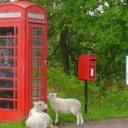Yahoo Clever wird am 4. Mai 2021 (Eastern Time, Zeitzone US-Ostküste) eingestellt. Ab dem 20. April 2021 (Eastern Time) ist die Website von Yahoo Clever nur noch im reinen Lesemodus verfügbar. Andere Yahoo Produkte oder Dienste oder Ihr Yahoo Account sind von diesen Änderungen nicht betroffen. Auf dieser Hilfeseite finden Sie weitere Informationen zur Einstellung von Yahoo Clever und dazu, wie Sie Ihre Daten herunterladen.
Are there any pagans viewing this question?
If so, what does paganism mean to you? I don't mean you teens trying to find a place for yourself, I mean actual pagans. If you are not pagan, what's your opinion on paganism? Do you understand it at all, if not, why?
6 Antworten
- Anonymvor 4 Jahren
This isn't a forum. This isn't a place to create discussion (see Y!A ToS). If you want that, go find a forum. PaganSpace.net is probably the perfect place for this, uh, question.
- vor 4 Jahren
My grandmother was a Pagan and I was so amazed at their beliefs (I am a Christian, btw). It is from them that I heard supernatural (natural actually, nature as a living thing haha). Like for example, fire coming to life to light the way of an old woman. Bamboo trees swaying to fend-off lumberjacks. Fireflies gathering up to form a human-like shape. These were stories not to scare kids but stories of experiences and they truly believe it. It really is interesting, how small details of their dances has a meaning. For example, a waving hand being raised is a praise for the wind, etc. I really find it amazing and interesting. I forgot to mention that they live in a so rural place which I was able to visit and experience in its raw-form (pre-modernization) 20+ years ago. And believe me or not, I saw a glowing whisp. If it wasn't what I though it was then, it still was truly majestical (haha, magical).
- Anonymvor 4 Jahren
Pagan originally meant simply a dweller in a rural community, but since those country people were often the last to be converted, it came to be used by city dwellers as applying to all who did not adopt their professed Christian beliefs.
PEOPLE OF THE LAND (EARTH)
This expression (Heb., ʽam ha·ʼaʹrets, with its plural forms) occurs 75 times in the Hebrew text. In Jesus’ day it was employed by the religious leaders as a term of contempt, but originally this was not the case.
The Hebrew and Aramaic lexicon by Koehler and Baumgartner explains this Hebrew expression to mean “the citizens possessing the full rights.” (Lexicon in Veteris Testamenti Libros, Leiden, 1958, p. 711) The Interpreter’s Dictionary of the Bible states that the term “in the strict sense includes only the responsible male citizenry, the married men who live on their own land and have full rights and duties, including the duty of serving in the army and of participating in judicial proceedings and . . . festivals.” (Edited by G. A. Buttrick, 1962, Vol. 1, p. 106) (Compare Le 20:2-5; 2Ki 15:5; 16:15; Eze 45:16, 22; 46:3, 9.) Thus, originally, the expression was one of respect. It did not apply only to a lowly class or those of the poorer element.
In bargaining for the property rights to the cave of Machpelah, Abraham dealt with the Hittite “people of the land.” (Ge 23:7, 13, RS) In these verses both An American Translation and the New World Translation render the Hebrew ʽam ha·ʼaʹrets as “natives.” Pharaoh, in speaking to Moses and Aaron, referred to the Israelites dwelling in Goshen as “the people of the land.” (Ex 5:5) The expression was used in the singular to embrace all the people of Canaan (Nu 14:9), and with the plural of ʽam (ʽam·mehʹ, “peoples”) to describe them as forming separate tribes or peoples within that land. (Ne 9:24, 30) It is used in a similar way to refer to the subject peoples within the Persian Empire in Queen Esther’s time. (Es 8:17) Sennacherib used the full plural form (ʽam·mehʹ ha·ʼara·tsohthʹ, “peoples of the lands”) as applying to the many peoples or nations conquered by the Assyrian forces.—2Ch 32:13.
Within the nation of Israel, the phrase ʽam ha·ʼaʹrets often distinguished the general citizenry from governmental or priestly officials. (2Ki 11:14, 18-20; Jer 1:18; 34:19; 37:2; 44:21; Eze 7:27; Da 9:6; Zec 7:5) However, it is evident that it embraced not merely the poor laboring class but also included persons of means, since Ezekiel, after decrying the injustices committed by greedy prophets, priests, and princes, inveighs against “the people of the land” who have “carried on a scheme of defrauding and have done a tearing away in robbery, and the afflicted one and the poor one they have maltreated, and the alien resident they have defrauded without justice.” (Eze 22:25-29) To pay the heavy duties imposed by Pharaoh Nechoh, King Jehoiakim “exacted the silver and the gold from the people of the land” by means of taxation. Thus the ʽam ha·ʼaʹrets that struck down the conspirators against King Amon and made Josiah king or that later made Jehoahaz king were no so-called rabble element. (2Ki 23:30, 35; 21:24) When Nebuchadnezzar conquered Judah, 60 men of “the people of the land” were included along with the high court officials who were taken to Riblah and executed, these 60 doubtless being among the more prominent or leading citizens. (2Ki 25:19-21) Of course, the phrase ʽam ha·ʼaʹrets did embrace the poor and lowly citizens as well, and the king of Babylon designated a number of such to remain in Judah, as he had done earlier in Jerusalem.—2Ki 24:14; 25:12; Jer 40:7; 52:15, 16.
In postexilic times Ezra and Nehemiah condemned the wrong practice of the returned exiles in mingling with “the peoples of the land(s),” marrying their women, allowing them to carry on commerce within the city on the Sabbath, and learning their detestable practices. (Ezr 9:11; 10:2, 11; Ne 10:28, 31) The expression here referred to the surrounding non-Israelite peoples specified at Ezra 9:1, 2, and the reason for separating from them was not because of any low social or economic position on their part but because of God’s law requiring purity of worship.—Ne 10:28-30.
As a Term of Contempt. In course of time, however, the religious leaders of Judah began to use the term to designate those persons, Jewish or non-Jewish, who were unlearned in the Law and more particularly those who were ignorant of or who failed to observe in detail the great body of rabbinic traditions that now developed. (Mt 15:1, 2) The term expressed the contemptuous attitude exemplified in the statement of the Pharisees at John 7:49: “This crowd that does not know the Law are accursed people.” Rabbi Joshua said that an ʽam ha·ʼaʹrets is: “Anyone who does not put on tefillin [phylacteries].” Other rabbinic statements applying to such nonobservers of Jewish traditions were: “Even if one has learnt Scripture and Mishnah, if he has not ministered to the disciples of the wise, he is an ʽam ha-arez.” (Babylonian Talmud, Berakhot 47b, translated by M. Simon) “Neither is an ignorant person [ʽam ha·ʼaʹrets] pious.” (Babylonian Talmud, Avot 2:5, translated by J. Israelstam) “The illiterate will not be resurrected.” (Babylonian Talmud, Ketubbot 111b, translated by I. Slotki) (Compare Mt 9:11; Lu 15:2; 18:11.) Jesus, however, said that he “came to call . . . sinners,” and he showed affection for the people who were “thrown about like sheep without a shepherd.”—Mt 9:13, 36.
Quelle(n): it2 bi - Wie finden Sie die Antworten? Melden Sie sich an, um über die Antwort abzustimmen.
- ?Lv 6vor 4 Jahren
Paganism is the worship of nature, for example: the sun, moon, stars, rocks, trees, lakes, rivers. In ancient times people would through a small trinket, like a statue into a river, so that the river god could allow them a safe journey.
Stone hedge (The Giant's circle) is one of the most famous pagan ritual sites, but there are plenty of other stone circles, minhirs(standing stones), that were worshiped by Pagans.





